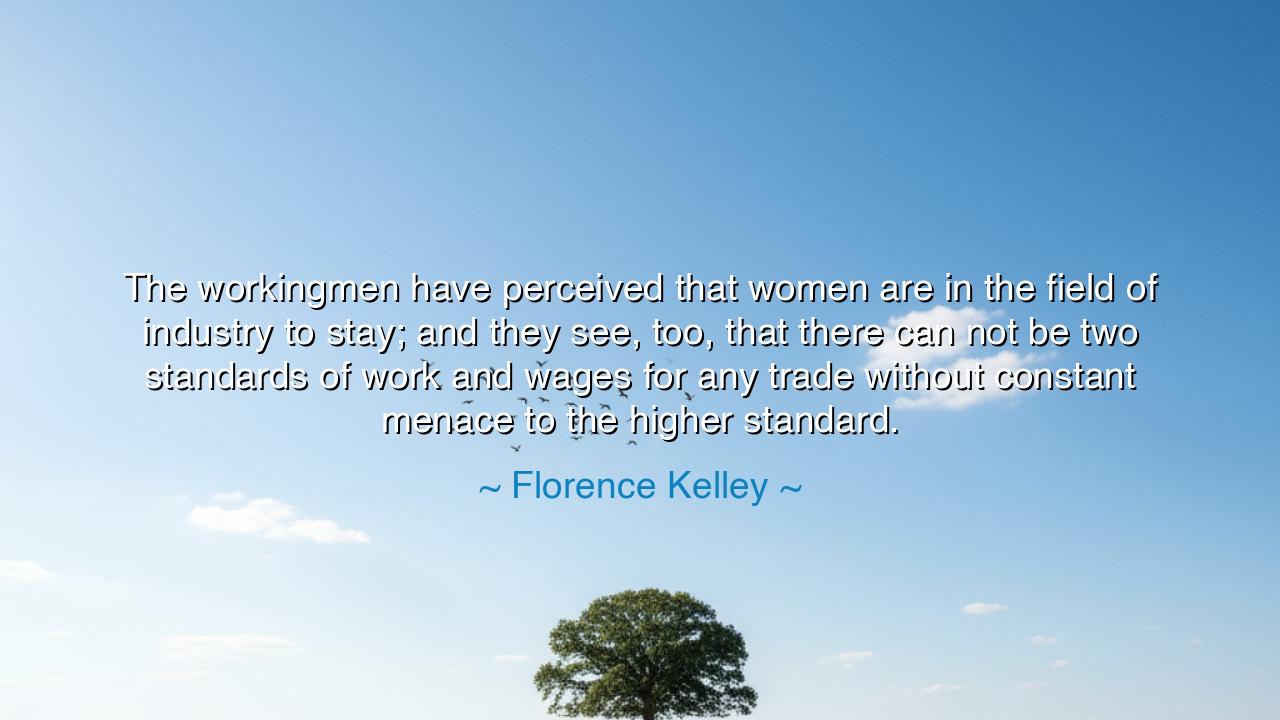
The workingmen have perceived that women are in the field of
The workingmen have perceived that women are in the field of industry to stay; and they see, too, that there can not be two standards of work and wages for any trade without constant menace to the higher standard.






The words of Florence Kelley, tireless reformer and guardian of laborers, resound with the voice of justice: “The workingmen have perceived that women are in the field of industry to stay; and they see, too, that there can not be two standards of work and wages for any trade without constant menace to the higher standard.” In this saying, she reveals a truth both simple and profound: that women are not visitors in labor, but permanent builders of industry, and that to deny them equal wages is to imperil not only women, but men, and the dignity of work itself.
The ancients knew that when injustice festers, it corrodes the whole. In Rome, slaves filled the workshops while free men languished, and soon the labor of citizens lost its honor. So too did Kelley warn her generation: that if two standards exist—one for men, one for women—then all are weakened. The exploitation of women’s labor does not raise men, but drags the wage of all downward, until the higher standard itself is consumed.
Her words were forged in the fires of the Industrial Revolution, when women and children toiled in sweatshops for pennies, while men earned more for the same labor. Kelley, who fought against child labor and for the rights of workers, saw clearly that this division was a weapon in the hands of employers. By paying women less, they used them to undercut men, sowing division among laborers. True solidarity, she taught, required men to see women not as rivals, but as comrades in the same struggle for dignity.
Consider the strike of the Lowell Mill Girls in the 1830s. These young women, facing long hours and meager pay, walked out of the factories to demand justice. Their action shook the nation, for it revealed that women were no passive labor force—they were fighters, and their presence in industry was permanent. They embodied Kelley’s truth: women were not temporary, nor weak, but part of the enduring army of workers whose cause was bound together with men’s.
Let the generations remember: equality in labor is not a gift to women alone, but a safeguard for all who toil. To divide workers by wage or sex is to weaken them; to unite them under one standard is to strengthen the whole. Florence Kelley’s wisdom remains a beacon: women are in the field of industry to stay, and only through equal work and equal wage can the dignity of labor be preserved. For justice is indivisible, and when it is denied to one, it is imperiled for all.






LCDao Nu Le Chi
Florence Kelley’s quote suggests that unequal standards in the workforce can be harmful, not just to women, but to the overall integrity of industries. I completely agree with the idea that two different standards of work and wages create a destabilizing effect. Shouldn’t the goal be to create a workforce where every worker is valued based on their skills and contributions rather than their gender? How can we push for this kind of transformation in industries that are slow to change?
KNKhoi Nguyen
Kelley’s perspective offers an insightful observation on the intersection of gender and labor. The concern about two different standards in the workplace is still very relevant today. How can we ensure that women entering the workforce are treated with the same respect, opportunities, and pay as their male counterparts? And how can we encourage industries to remove outdated wage discrepancies that negatively affect everyone, not just women?
HNHoang Nam
This quote raises a valid concern about the impact of unequal standards on the workforce, especially when women start entering industries traditionally dominated by men. By lowering wages or standards for women, society risks undermining the progress made for all workers. But what about the people who argue that the market should dictate wages without considering gender? How do we balance these arguments with the need for fair, equal pay across the board?
HGHung Ga
Florence Kelley’s quote speaks to the evolving role of women in the workforce and the necessary evolution of wages and standards. It’s true that when women enter any profession, the standards of work and wages need to adjust to ensure equality. Does this mean that we must continue to fight for equal pay and work conditions to protect the higher standards, or should we focus on making sure all workers are valued equally, regardless of gender?